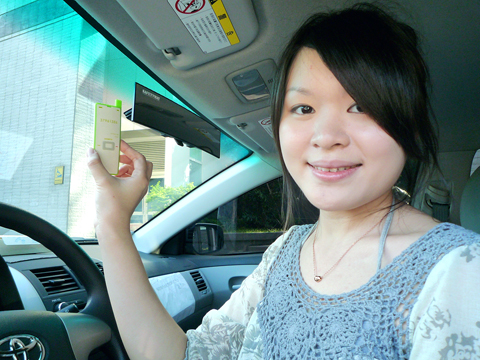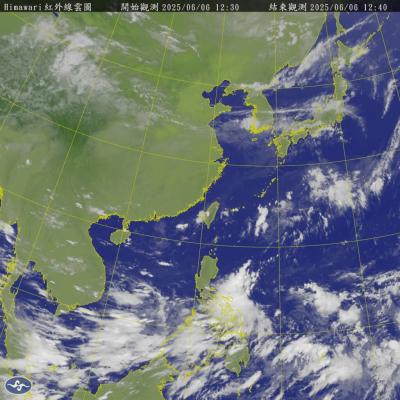Have you ever had the experience of seeing your mobile phone flying out of its holder when turning your car? If you do, a “sticky phone” may be your solution.
The design by National Taiwan University of Science and Technology (NTUST) student Liu Hsiang-ling (劉香伶) is one of this year’s winners of the iF concept award, which was announced recently by the Hanover-based International Forum Design GmbH (iF).
The mobile phone is made of polysiloxane and has solar panels installed on the back. Liu said she came up with the idea for the phone from her own driving experience. The device, which can be stuck to a window, will stay put while the car is in motion and can be recharged by absorbing sunlight through the windshield.

PHOTO: CHEN HSUAN-YU, TAIPEI TIMES
“I drive to school everyday and I have always had the idea of having my mobile phone stick to the window glass, just like a doll,” Liu said.
The iF concept award, which was started last year, is an international competition for new talent that is open to students in the fields of design and architecture.
A total of 3,221 concepts and ideas were submitted by students from 39 countries this year.
Nine of the concepts contributed by Taiwanese students were included in the “Best 100” list announced last month by iF, making the country one of the biggest winners of the annual event.
Three of the nine concepts were by students from NTUST. The “iF University Ranking” system ranked NTUST in second place based on the performance of contestants in the iF concept award over a period of two years.
Two other NTUST winners were Yeh Ming-hong (葉銘泓) and Lai Chung-ping (賴忠平), who designed “eat clean” tableware.
The “eat clean” design was intended as a solution for people who feel uncomfortable about using cutlery that has been in contact with the tabletop. The design, which combines the special shape and weight principle of a seesaw, enables the parts of the cutlery in contact with the mouth to always stay away from the tabletop, whichever way the cutlery is placed.
Another of this year’s winners was a “braille scanner” by Wang Fu-hua from Tainan National University of the Arts. The design, a mobile phone intended for the visually impaired that can convert braille into audible speech, was given 28th place out of the “Best 100,” which shared 30,000 euros (US$40,000) in prize money.
Designs by other Taiwanese students on the “Best 100” list included the “so sweet” clinical thermometer, which turns the instrument into a lollipop with a sweet coating that melts on contact with saliva, giving users a pleasant experience while having their temperature taken.
Another design was the “rabbit hanger,” which is a clothes hanger that doubles up as a tool for putting on clothes and shoes. On one end of the hanger is a zipper pull and on the other a shoehorn.
The “freedle” was a needle equipped with an eye made of soft flexible nylon that allows thread to be pulled through more easily. Also, the needle’s fluorescent material makes it easier to find if it drops onto the floor or somewhere dark.
The “plug for visually impaired” was a set of tracks leading to an electric socket that allows visually impaired people to insert a plug more easily.
The “so water” was a shower fittings with a new style of faucet that helps users avoid being splashed when they forget to switch the shower over before using the tap.

STAY AWAY: An official said people should avoid disturbing snakes, as most do not actively attack humans, but would react defensively if threatened Taitung County authorities yesterday urged the public to stay vigilant and avoid disturbing snakes in the wild, following five reported snakebite cases in the county so far this year. Taitung County Fire Department secretary Lin Chien-cheng (林建誠) said two of the cases were in Donghe Township (東河) and involved the Taiwan habus, one person was bit by a Chinese pit viper near the South Link Railway and the remaining two were caused by unidentified snakes. He advised residents near fields to be cautious of snakes hiding in shady indoor areas, especially when entering or leaving their homes at night. In case of a

A tropical disturbance off the southeastern coast of the Philippines might become the first typhoon of the western Pacific typhoon season, the Central Weather Administration (CWA) said. The system lacks a visible center and how it would develop is only likely to become clear on Sunday or Monday, the CWA said, adding that it was not yet possible to forecast the potential typhoon's effect on Taiwan. The American Meteorological Society defines a tropical disturbance as a system made up of showers and thunderstorms that lasts for at least 24 hours and does not have closed wind circulation.

ENERGY RESILIENCE: Although Alaska is open for investments, Taiwan is sourcing its gas from the Middle East, and the sea routes carry risks, Ho Cheng-hui said US government officials’ high-profile reception of a Taiwanese representative at the Alaska Sustainable Energy Conference indicated the emergence of an Indo-Pacific energy resilience alliance, an academic said. Presidential Office Secretary-General Pan Men-an (潘孟安) attended the conference in Alaska on Thursday last week at the invitation of the US government. Pan visited oil and gas facilities with senior US officials, including US Secretary of the Interior Doug Burgum, US Secretary of Energy Chris Wright, Alaska Governor Mike Dunleavy and US Senator Daniel Sullivan. Pan attending the conference on behalf of President William Lai (賴清德) shows a significant elevation in diplomatic representation,

Credit departments of farmers’ and fishers’ associations blocked a total of more than NT$180 million (US$6.01 million) from being lost to scams last year, National Police Agency (NPA) data showed. The Agricultural Finance Agency (AFA) said last week that staff of farmers’ and fishers’ associations’ credit departments are required to implement fraud prevention measures when they serve clients at the counter. They would ask clients about personal financial management activities whenever they suspect there might be a fraud situation, and would immediately report the incident to local authorities, which would send police officers to the site to help, it said. NPA data showed